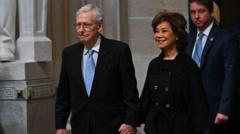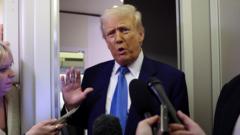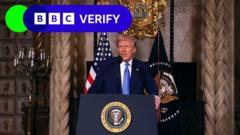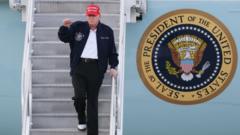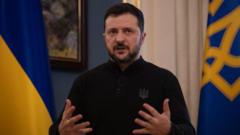As European leaders gather to address the Ukraine conflict, UK Prime Minister Keir Starmer's proposal to deploy troops exemplifies a proactive stance towards regional security and cooperation.
Starmer Proposes Troop Deployment to Ukraine Amid Peace Deal Discussions

Starmer Proposes Troop Deployment to Ukraine Amid Peace Deal Discussions
Keir Starmer expresses readiness to send British troops for Ukraine's security, highlighting urgency around ongoing peace talks.
Prime Minister Keir Starmer made headlines on Sunday with his offer to send British troops to Ukraine as a security guarantee in the context of a potential peace deal. This bold assertion signifies a pivotal moment in the UK’s stance on the ongoing Ukraine war, coinciding with an emergency meeting of European leaders set to take place in Paris.
In an opinion piece released in The Daily Telegraph, Starmer expressed his commitment to contributing to Ukraine's defense, marking the first instance in which he has explicitly considered sending British military personnel to the embattled nation. His declaration aims to respond to President Trump’s initiative to engage in dialogue with Russia about ending the conflict, which raised concerns among European officials regarding their role in future negotiations.
Starmer's comments reflect a measured approach to peace negotiations, emphasizing the need for a sustainable resolution that effectively safeguards Ukraine's sovereignty. He articulated that a mere cessation of hostilities would not suffice to deter Russian President Vladimir Putin’s future aggression. “The end of this war, when it comes, cannot merely become a temporary pause before Putin attacks again,” he warned.
As talks between American and Russian officials are anticipated to commence this week in Saudi Arabia, Starmer’s proposal underscores the urgency felt among European leaders as they seek coordination in response to Trump’s rapprochement with Moscow. Notably, Ukraine has opted out of the Saudi discussions, deepening the uncertainty surrounding its future in the diplomatic process.
The Paris meeting is expected to convene key players, including leaders from France, Germany, Italy, and other European nations, along with representatives from the European Union and NATO. Starmer plans to advocate for increased military expenditures within NATO and reinforced support for Ukraine, asserting that its admission to NATO remains an “irreversible” goal.
In his article, Starmer also underscored the essential role of U.S. involvement in securing a lasting peace, stressing that only American guarantees could effectively deter threats from Russia in the future. This reflects a broader consensus among Western leaders regarding the importance of collaboration in negotiating peace while ensuring regional stability.
Overall, Starmer’s declaration and the Paris meeting signify a renewed commitment to addressing the ramifications of the Ukraine war, as European leaders seek to define their collective strategy in the face of evolving geopolitical dynamics.


